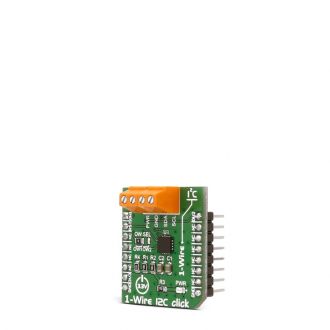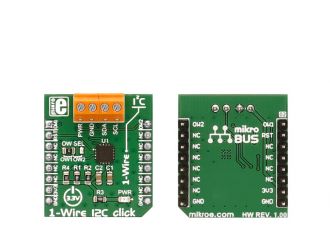
We strongly encourage users to use Package manager for sharing their code on Libstock website, because it boosts your efficiency and leaves the end user with no room for error. [more info]

Rating:
Author: MIKROE
Last Updated: 2019-05-23
Package Version: 1.0.0.1
mikroSDK Library: 1.0.0.0
Category: 1-Wire
Downloaded: 8607 times
Not followed.
License: MIT license
1-Wire I2C click converts the 1-wire signal from the MCU to I2C signal, which is then sent to the slave, and vice versa.
The click carries DS28E17 1-Wire-to-I2C master bridge from Maxim Integrated. 1-Wire I2C click runs on a 3.3V power supply.
Do you want to subscribe in order to receive notifications regarding "1-Wire I2C click" changes.
Do you want to unsubscribe in order to stop receiving notifications regarding "1-Wire I2C click" changes.
Do you want to report abuse regarding "1-Wire I2C click".


Library Description
The library covers all the necessary functions to control OneWire I2C click board.
The library performs the communication with the device via 1-Wire protocol by writing to registers and by reading from registers.
Key functions:
Examples description
The application is composed of the three sections :
void applicationTask()
{
onewirei2c_skipRom ();
CRCPacket[ 0 ] = 0x5A;
CRCPacket[ 1 ] = 0x90;
CRCPacket[ 2 ] = 0x01;
CRCPacket[ 3 ] = 0x00;
CRCResult = onewirei2c_crc16( &CRCPacket, 4 );
CRCPacket[ 0 ] = CRCResult & 0x00FF;
CRCPacket[ 1 ] = ( CRCResult >> 8 ) & 0x00FF;
onewirei2c_oneWireWrite( 0x5A );
onewirei2c_oneWireWrite( 0x90 );
onewirei2c_oneWireWrite( 0x01 );
onewirei2c_oneWireWrite( 0x00 );
onewirei2c_oneWireWrite( CRCPacket[ 0 ] );
onewirei2c_oneWireWrite( CRCPacket[ 1 ] );
owStatus = onewirei2c_oneWireRead();
owStatus >>= 1;
writeStatus = onewirei2c_oneWireRead();
writeStatus >>= 1;
onewirei2c_skipRom();
CRCPacket[ 0 ] = 0x87;
CRCPacket[ 1 ] = 0x91;
CRCPacket[ 2 ] = 0x02;
CRCResult = onewirei2c_crc16( &CRCPacket, 3 );
CRCPacket[ 0 ] = CRCResult & 0x00FF;
CRCPacket[ 1 ] = ( CRCResult >> 8 ) & 0x00FF;
onewirei2c_oneWireWrite( 0x87 );
onewirei2c_oneWireWrite( 0x91 );
onewirei2c_oneWireWrite( 0x02 );
onewirei2c_oneWireWrite( CRCPacket[ 0 ] );
onewirei2c_oneWireWrite( CRCPacket[ 1 ] );
owStatus = onewirei2c_oneWireRead();
readData[ 0 ] = onewirei2c_oneWireRead();
readData[ 1 ] = onewirei2c_oneWireRead();
owStatus >>= 1;
owStatus |= ( ( 0x01 & readData[ 0 ] ) * 0x80 );
owStatus *= 0x80;
readData[ 0 ] >>= 1;
readData[ 0 ] |= ( ( 0x01 & readData[ 1 ] ) * 0x80 );
ByteToStr( readData[ 0 ], logText );
mikrobus_logWrite( " Temperature : ", _LOG_TEXT );
mikrobus_logWrite( logText, _LOG_TEXT );
if ( readData[ 1 ] > 0x7F )
{
mikrobus_logWrite( ".5 ",_LOG_TEXT );
}
else
{
mikrobus_logWrite( ".0 ", _LOG_TEXT );
}
mikrobus_logWrite( degCel, _LOG_LINE );
Delay_1sec();
Delay_1sec();
}
Other mikroE Libraries used in the example:
One_WireUART​ConversionAdditional notes and informations
Depending on the development board you are using, you may need USB UART click, USB UART 2 click or RS232 click to connect to your PC, for development systems with no UART to USB interface available on the board. The terminal available in all MikroElektronika compilers, or any other terminal application of your choice, can be used to read the message